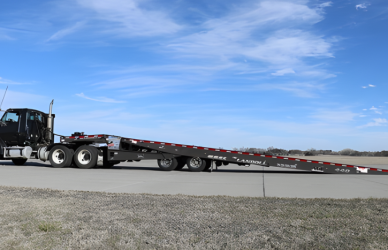A group of 24 states has taken legal action against the Environmental Protection Agency’s (EPA) recent filing and implementation of new truck emission standards, filing a petition for review in the U.S. Court of Appeals for the D.C. Circuit.
The group of states is represented by Republican attorneys general, led by Nebraska Attorney General Mike Hilgers, who initiated a lawsuit against California’s Advanced Clean Fleets rule.
While the specifics of their argument have yet to be disclosed, the states intend to contest the EPA’s expanded truck emission standards on the grounds that they go beyond the agency’s authority. The review petition calls the rule “arbitrary, capricious, an abuse of discretion and not in accordance with law.”
Hilgers characterized the new standards as out of touch with reality, asserting that the mandated shift to electric trucks is both inefficient and costly. He further argued that this transition would disproportionately burden Nebraskans by inflating interstate transportation expenses, raising commodity prices, and straining the electric power grid.
“California and an unaccountable EPA are trying to transform our national trucking industry and supply chain infrastructure,” Hilgers said. “This effort – coming at a time of heightened inflation and with an already-strained electrical grid – will devastate the trucking and logistics industry, raise prices for customers and impact untold number of jobs across Nebraska and the country. Neither California nor the EPA has the constitutional power to dictate these nationwide rules to Americans.”
Under the EPA’s updated regulations, 25% of new sleeper-cab tractors must be zero-tailpipe-emission trucks by 2032. Although manufacturers have flexibility in meeting this requirement through various technologies, there is a significant emphasis on battery-electric vehicles, largely due to pricing and charging infrastructure.
Electric trucks currently cost approximately $400,000, more than twice the cost of a diesel-powered truck. When interest is factored in over a standard 60-month loan term, this price gap only widens.
Plus, electric trucks offer a significantly shorter range, covering less than 300 miles compared to a diesel truck’s capacity. Coupled with lengthy charging times, electric trucks would take four to five days to complete a 1,000-mile journey—a task that diesel-powered trucks can accomplish in just two days.
According to a cost analysis conducted by Ryder, transitioning to electric trucks would double the operating expenses for Class 8 vehicles, leading to a 1% rise in overall inflation as additional costs are passed on to consumers.
This legal challenge follows closely on the heels of Republican lawmakers’ introduction of a resolution aimed at overturning the EPA’s final rule. Senators Pete Ricketts (R-Neb.) and Dan Sullivan (R-Ark.), along with Representative John James (R-Mich.), presented Congressional Review Act (CRA) resolutions to void the EPA’s strict emission standards for heavy-duty trucks and passenger vehicles. Sullivan ended his statement with a quote from the Owner-Operator Independent Drivers Association.
“Small-business truckers make up 96% of trucking and could be regulated out of existence if the EPA’s misguided mandate comes into effect,” said Todd Spencer, OOIDA president. “This could have devastating effects on the reliability of America’s supply chain and ultimately on the cost and availability of consumer goods. Local mom-and-pop trucking businesses would be suffocated by the sheer cost and operational challenges of effectively mandating EV trucks. We thank Sen. Ricketts and Sen. Sullivan for their leadership in Congress in standing up for America’s small-business truckers to fight EPA’s unworkable emission regulations.”
Source: Land Line











